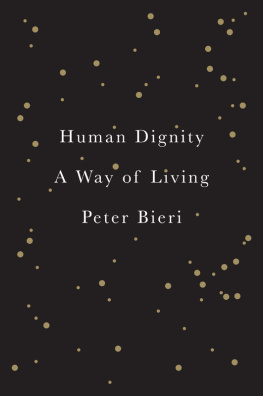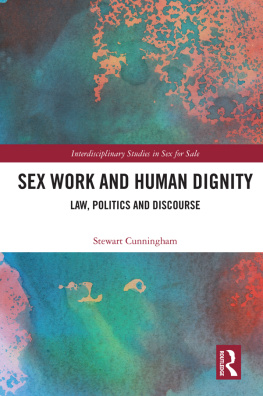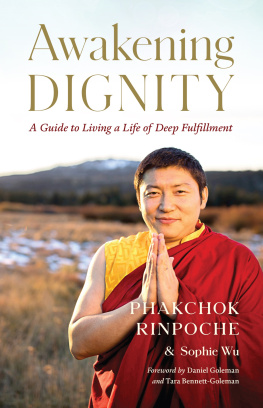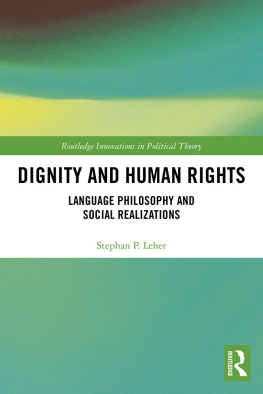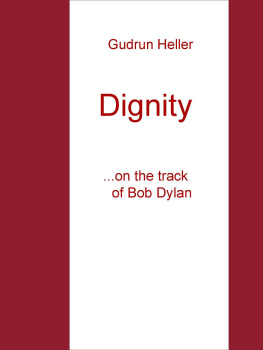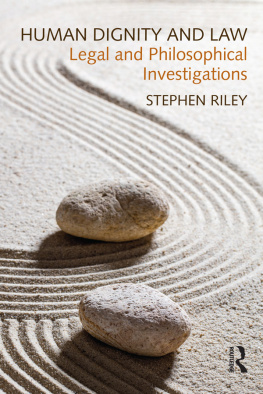
Series page
A dignidade no uma coisa, mas muitas. O que importa compreender como, na vida de um ser humano, estas muitas coisas se relacionam entre si. Se uma pessoa tenta dizer o que dela julga perceber, torna-se, involuntariamente, algum que traa um extenso mapa da existncia humana. A falta de modstia que isto implica inevitvel, e portanto, assim espero, pode ser perdoada.
Pedro Vasco de Almeida Prado
Sobre o que importante
Lisboa, 1901
Dignity is not one thing, but many. What matters is understanding how these different things are interconnected in a person's life. When someone tries to express what he believes he understands of this matter, he will involuntarily end up drawing a sweeping map of human existence. The immodesty that lies in this is inevitable and hence, I hope, will be pardonable.
Pedro Vasco de Almeida Prado
On what is important
Lisbon, 1901
Copyright page
First published in German as Eine Art zu leben. ber die Vielfalt menschlicher Wrde Carl Hanser Verlag, Munich, 2013
This English edition Polity Press, 2017
The translation of this work was funded by Geisteswissenschaften International Translation Funding for Humanities and Social Sciences from Germany, a joint initiative of the Fritz Thyssen Foundation, the German Federal Foreign Office, the collecting society VG WORT and the Brsenverein des Deutschen Buchhandels (German Publishers & Booksellers Association).
Polity Press
65 Bridge Street
Cambridge CB2 1UR, UK
Polity Press
350 Main Street
Malden, MA 02148, USA
All rights reserved. Except for the quotation of short passages for the purpose of criticism and review, no part of this publication may be reproduced, stored in a retrieval system, or transmitted, in any form or by any means, electronic, mechanical, photocopying, recording or otherwise, without the prior permission of the publisher.
ISBN-13: 978-0-7456-8901-2
A catalogue record for this book is available from the British Library.
Library of Congress Cataloging-in-Publication Data
Names: Bieri, Peter, 1944- author.
Title: Human dignity : a way of living / Peter Bieri.
Other titles: Art zu leben. English
Description: English edition. | Malden, MA : Polity Press, 2016. | Includes bibliographical references.
Identifiers: LCCN 2016023506| ISBN 9780745689012 (hardback : alk. paper) | ISBN 9780745689043 (mobi)
Subjects: LCSH: Respect for persons. | Conduct of life. | Dignity. | Philosophical anthropology. | Autonomy (Philosophy)
Classification: LCC BJ1533.R42 B5413 2016 | DDC 170/.44dc23 LC record available at https://lccn.loc.gov/2016023506
Typeset in 10.5 on 12 pt Sabon
by Toppan Best-set Premedia Limited
Printed and bound in the UK by Clays Ltd, St Ives PLC
The publisher has used its best endeavours to ensure that the URLs for external websites referred to in this book are correct and active at the time of going to press. However, the publisher has no responsibility for the websites and can make no guarantee that a site will remain live or that the content is or will remain appropriate.
Every effort has been made to trace all copyright holders, but if any have been inadvertently overlooked the publisher will be pleased to include any necessary credits in any subsequent reprint or edition.
For further information on Polity, visit our website:
politybooks.com
Dignity as a Way of Living

Philosophy, as I understand it, is the attempt to bring conceptual clarity to important experiences of human life. In order to think and talk about these experiences, we have invented terms that are self-explanatory when used within their usual contexts. Sometimes, however, we wish to know more about what they actually mean, because something important is at stake both in terms of understanding and of action. When we then take a step back from our linguistic habits and focus on the ideas themselves, we become confused because we realize that we did not at all understand what we were talking about the whole time. All of a sudden, the terms seem strange and mysterious.
This may happen to us with the concept of dignity. We know that human dignity is something important, that must not be violated. But what is it actually? What is it exactly? To gain clarity on this question, we can follow two different conceptual paths. The first regards dignity as a human property, as something that humans possess by virtue of being human. Then it is important to make sense of the nature of this property. We would not want to understand it as a natural, sensory property but as a special kind of property that is rather like a right: the right to be respected and treated in a certain way. We would regard it as a right that is immanent to every human being, that she carries within herself and that she cannot be robbed of, no matter how many horrible things are inflicted upon her. Some readings trace back this right and make sense of it in terms of our relationship with God as the creator.
In this book, I follow another path and take up a different perspective. Human dignity, as I understand and discuss it here, is a certain way of leading one's life. It is a pattern of thought, of experience and of action. Understanding this idea of dignity means envisioning this conceptual pattern and tracing it in our minds. For this, we do not need a metaphysical conception of the world. Instead, what we need is a keen and sharp look at the wide-ranging experiences that we seek to capture with the concept of dignity. What we have to do is to understand all these experiences in detail and ask ourselves how they are interconnected. We have to fathom the intuitive content of the experience of dignity.
There are three different dimensions to dignity as a way of living. The first is the way that I am treated by other people. They can treat me in such a way that my dignity remains intact, or they can destroy my dignity. Here dignity is something that is determined by others. To bring to mind this dimension, I can ask myself the following question: What can someone take away from another person when he wants to destroy his dignity? Or: What must one not take away from the other when he wants to protect his dignity? That way, I can gain an overview of the different facets of dignity in so far as it is dependent on others and clarify for myself how these facets are interconnected.
The second dimension also concerns other people in my life. But this time, it is not about how they treat me, but about how I treat them, and, more broadly, how I view them: what kind of attitude I have to them. It concerns what role, from my perspective, they play in my life. In this case, dignity is not something that is determined by others, but by me. The guiding question is: Which patterns of experience and conduct towards others allow me to preserve my dignity? And which actions and experiences cause me to forfeit it? In the first dimension, the responsibility for my dignity lies with others: it is their actions that either preserve or destroy it. In the second dimension, this responsibility lies exclusively with me: it is up to me whether or not I succeed in leading a dignified life.
In the third dimension, it is also me who decides about my dignity. It concerns the view that I have of myself. The question one needs to ask here is: Which ways of seeing, judging and treating myself let me experience dignity? And when do I feel as if I am forfeiting my dignity because of the way I behave towards myself?
Next page
